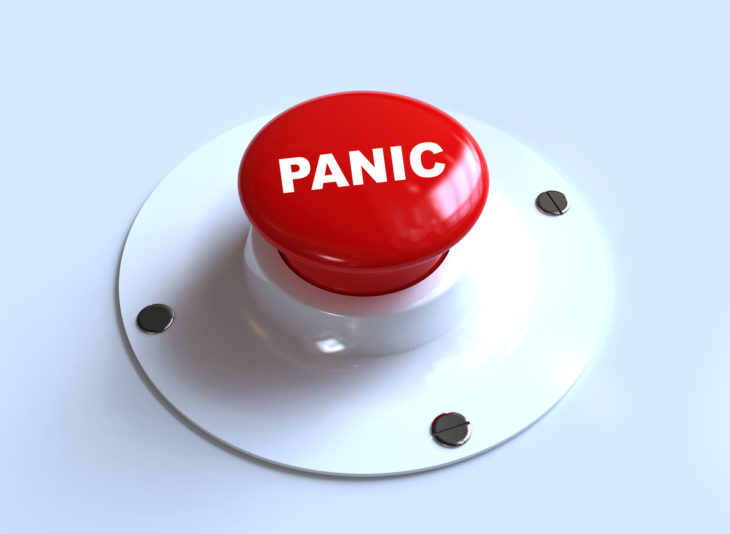Two days before my birthday last November, I got a facial at my favorite spa. I lay down on the bed, with the paper gown tucked around me, and the technician went about working her magic on my pores. She put a mask on my face and left me to relax for 10 minutes, with cucumbers resting gently over my eyes, the lights dimmed, and soothing music playing. The setting should’ve been everything I needed to stay calm, and it was … for about two minutes. Then my phone beeped, and I saw a text from a friend telling me to check her Twitter stream ASAP. Of course, I was curious, but I couldn’t get a signal, and spent the rest of the “rest period” feeling antsy, continually picking up my phone to see if suddenly service had been restored. The serenity that I look for when I go to the spa, the chance to shut off my mind while getting my skin rejuvenated, wasn’t there, because all I could think about was when I could get out of the room to check my phone.
Later that afternoon, I decided to see a free play reading at a theater in the West Village. The playwright and I have mutual friends and I loved the idea of getting to do something for free that I couldn’t have done at my day job. I was running late, as usual, and chose the subway stop nearest where I thought the theater was. Then I found myself walking this way and that way, cursing to myself and then to anyone in the street as I realized I wasn’t going to be able to find the theater. I felt so stupid, because I’ve lived in New York since 1996; I should know where I’m going. Even though the West Village is notorious for its winding, hard to navigate streets, I was sure it was my fault. I took my iPhone and slapped it hard against my inner arm, the sting a reminder of my error, a physical manifestation of my anger at myself.

Source: University of Nottingham Blogs
The next day, when I should’ve been giddy with excitement, I really started to lose it. I was going to be appearing on The Gayle King Show the next day, live, on my birthday, talking about cupcakes and National Vanilla Cupcake Day (yes, it’s a food holiday, one of many). I was thrilled, but not so deep down was an undercurrent of fear. What if I messed up? What if something went wrong? I ignored those niggling doubts until I was forced to confront them. I don’t know if what happened to me was officially a panic attack, but I do know that it was scary, disturbing and disorienting. No sooner had I walked out of the TV producer’s office, the elevator doors closed behind me, and I broke down. I started crying, what I think of as “real” crying, tears streaming down my face as I made my way out into the Manhattan sunshine. It wasn’t because of anything the producer said; he was kind and supportive, and therefore the crying was more unexpected. I wasn’t “sad,” but I was scared.
The more I cried, the more the tears turned into sobs, which turned into hitches of breath and the overall sense that I was starting to lose my mind. I wanted to sit down on the sidewalk and collapse, but I had to keep moving. At least in New York City it’s not that weird to be walking around talking to yourself, which I did. I whispered silently and out loud that it was okay if, worst case, I decided to bail on the TV show if it was too overwhelming. I kept going, making the stops I needed to, but whenever even the slightest thing went wrong, like getting caught in traffic, I not only got very upset, but I got upset at myself, like it was my fault.
I didn’t want to tell the producers or anyone else that I was having a freakout, lest they ditch me for someone more capable of being calm on camera. As it turned out, everything got sorted out; even the cupcakes that were stuck on a plane wound up making their way to me. I was happy with how I did on the live show, and I’m pretty sure you wouldn’t know I had all these fears swirling in the back of my mind from how I looked and sounded. But that doesn’t mean I was immediately “better.” It’s scary to lose it like that, to feel like you’re utterly incompetent and incapable, and like the line between “normal” and “panicked” is a very fine one.

Source: Healthline
I’ve noticed in the two months since then that while that severe kind of reaction is rare for me, smaller panics set in quite often. The other day, sitting at my favorite coffee shop, I startled myself by banging loudly on the table, aggravated almost to the point of tears when my computer was taking too long to load a page. Especially when I’m PMSing, I feel utterly unequipped to deal with even the slightest change or frustration, and the memory of that panicked freakout is always there, like my body knows that it’s capable of betraying me at any moment.
What’s ironic is that when bigger things go wrong, like getting laid off from my job of seven-plus years or bouncing a check or missing an airplane flight, I’m able to access a much calmer place inside of me, perhaps because in those cases it’s clear to me that there’s nothing I can do about the situation except move forward. In The Big Leap: Conquer Your Hidden Fear and Take Life to the Next Level (a book I highly recommend), Gay Hendricks identifies the pervasiveness of “worry-thoughts” and encourages readers to immediately ask themselves whether the worry is about a real possibility and “Is there any action I can take right now to make a positive difference?” If it’s not, and is more of an overall worry that lurks in the background of your mind, a menacing devil on your shoulder, he instructs you to set those thoughts aside and immediately ask, “What positive new thing is trying to come into being?”
For me, the panic was like an explosion of all the minor worries that were plaguing me. Even though I was honored and excited to get to be on live TV, on my birthday no less, a part of me was convinced that the show should’ve gotten someone else as a guest. I feel that way about everything from writing assignments to dates—there’s got to be someone better out there, right?—and often when I make a mistake, minor or major, all it does is confirm these doubts I have, rather than helping me figure out how not to make that same mistake in the future. In this case, if I were asked again, I would definitely say yes, but I would clarify what my responsibilities were and map them out so I wasn’t cramming so many tasks into one day, leaving me feeling pressured about time, with no wiggle room if anything went awry.

Source: Medium
The one good thing I can say about the extreme panic I experienced is that it forced me to face the fact that I was nervous, rather than pushing it aside because I wasn’t “supposed” to be. It wasn’t fun, and I hope I don’t experience it again, but I know that if I do, it’s a sign that something is severely amiss, and I need to address it head-on, rather than sweep it aside and hope it’ll just go away on its own.
Original by
